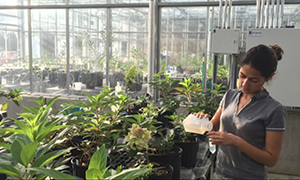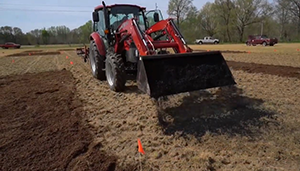
Dr. Forbes Walker, has spent his life serving the agricultural communities across Tennessee, the Southeast, and internationally. As a professor at UT's Institute of Agriculture and an environmental soil specialist for UT Extension, Dr. Walker manages and conducts research and applies the research findings to educate farmers on agricultural best management practices. This dually provides optimum production for the farmer and protects the environment through watershed management.
After completing studies in his homeland of Scotland, Dr. Walker did agricultural extension and community development in the eastern and southern regions of Africa for 10 years. He then received a Ph.D. in soil science at NC State University before joining UT Extension in 1998. In addition to his work in Tennessee, he participates in agricultural and community development in Guatemala, working on changes to soil management systems such as reducing soil tillage in the sugarcane industry that are seen as important responses to current and future climate change.
For the past five years Dr. Walker has directed a $5 million USDA NIFA-funded multi-disciplinary project studying agricultural production methods that might best adapt to climate change in the Tennessee and Cumberland River Basins in the future. A large team of researchers from five Universities across the state collaborated to model the effects of climate change at different watershed scales using current and future conditions. They investigated variations that might be seen in hydrology, flooding, irrigation, and agricultural economics. Some of the questions this study addresses include: How can Tennessee agriculture adapt to climate change? How will this impact row crop agriculture and livestock production? What can be done to improve Tennessee soils to maintain resilience with drought? The ultimate objective of this research is to ensure the future profitability and sustainability of agriculture in the state of Tennessee, as there have been more frequent floods and droughts, sometimes within the same year.
Tennessee is already considered a “no-till state,” with approximately 85 percent of farmers using this method for row crop agriculture. Tennessee has among the highest adoption rates of no-till agriculture in the world. Using no-till methods reduces soil erosion and nutrient loss. Dr. Walker stated that adding a winter cover crop significantly decreases soil erosion over just applying the no-till method. Cover crops increase water infiltration rates into the soil, which has implications for reducing flood potential during wetter periods, and conserving soil moisture during drier periods.
Diversifying the forage base for cattle with the use of native warm season grasses lengthens the foraging season and complements the existing cool season grass systems. Dr. Patrick Keyser, UT Center for Native Grasslands Management, has done extensive research on this and demonstrates to farmers that warm season grasses produce high quality forage that are good for cattle. These grasses also have fewer nutrient requirements and tolerate droughts better due to the deeper rooting system. As a result, the fields planted with warm season grasses have increased soil infiltration rates and become catch basins for water that reduce flooding.
Fenceline hay feeders are being researched by UT as a better way to feed cattle when fresh forage is not available either during winter, or in very wet or drought conditions. These feeders keep the hay dry, allowing the cattle to eat more hay rather than losing up to 50 percent from being trampled upon in the open pasture.

The use of biochar (a charcoal-like material produced from plant materials decomposed at high temperatures) as a soil amendment to nursery plants is being researched because it is high in carbon and other nutrient-holding properties. A graduate student of Dr. Walker's, Nastaran Basisi Jahromi, applied varying levels of biochar to pinebark media of hydrangeas and used soil moisture sensors to determine when water was needed. Traditional nursery practices are to water by eye rather than rely on a sensor. Jahromi was able to dramatically reduce the amount of water used (by over 30 percent) and produce the same growth as the traditional nursery-grown hydrangeas. There is reduced nutrient leachate, which means reduced nutrient losses due to water conservation.

Cover crop systems and biochar are being studied to improve soil resilience. There are areas in Tennessee where sand deposits are left behind on agricultural fields after flooding from nearby waterways. This amount of sand reduces soil water, nutrients, and crop yield. Adding biochar to these fields increases the water holding capacity. As the study continues they should see an increase in organic matter and increased crop yields.
Some other current and emerging projects include:
- Dr. Avat Shekoofa, a crop physiologist at the West TN Research & Education Center, is looking at soy bean and cotton varieties and growing these under less than ideal conditions to determine which varieties have genetic traits, such as stomatal control, that make them more adapted to drought conditions.
- Researching farm pond toxicity in the middle of summer that negatively affects the cattle.
- Rethinking the design of urban dog parks by having the dogs do their business as far away from streams or ponds as possible. Some dog parks have seen hazardous neurotoxin from fecal residue in the water that the dogs may drink or swim in.
- Nonpoint source pollution research at Bat Creek in Monroe County (between Tellico Village and Madisonville) that will involve doing some innovative projects with the agricultural community (funded by 319 NPS Grant).
Dr. Walker and his colleagues are providing verified answers and solutions that put more useful resources in the toolbox for the Tennessee agricultural community that will help them adapt to the challenges of climate change.
More information on the work that Dr. Walker and his colleagues are doing: